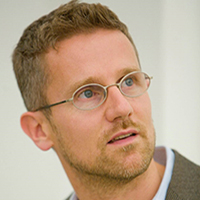Contact: Brenda Ellis, (615) 343-6314
Brenda.Ellis@Vanderbilt.edu
MIT Senseable City Lab Director Carlo Ratti to deliver Vanderbilt’s Hall Lecture Feb. 22
Carlo Ratti creates technological solutions that respond to citizens of cities. He makes cities senseable.

“In the midst of rapid urbanization, the concept of smart cities — or senseable cities — as we prefer to call it, is simply the manifestation of a broader technological trend. The internet is entering spaces we live in, and becoming the Internet of Things. As a result, many aspects of urban life are transformed: from energy to waste management, from mobility to water distribution, from city planning to citizen engagement.
“The way we see the difference between ‘smart’ and ‘senseable’ is a matter of focus — on technology per se, or on people,” Ratti said in an interview in Devex, a media platform for the development community.
Ratti, director of the Senseable City Lab at the Massachusetts Institute of Technology and an architect and engineer by training, will deliver the Vanderbilt School of Engineering’s John R. and Donna S. Hall Engineering Lecture Thursday, Feb. 22, in Featheringill Hall’s Jacob Believed In Me Auditorium at 4:10 p.m. A reception will follow in Adams Atrium. The lecture will be streamed live here.
“The deployment of sensors and hand-held electronics allows new approaches to the study of the built environment. The way we understand cities is being radically transformed – alongside the tools we use to design and influence their physical structure,” Ratti said.
In the Hall Lecture, Ratti will address these issues through projects by the Senseable City Laboratory, a research group at MIT that explores how new technologies change the way we understand, design and ultimately live in cities, and projects by the international design firm Carlo Ratti Associati.

Ratti contrasts the prevailing technocratic vision of smart cities – highlighting instead the ‘human face’ of urban technologies and their potential in promoting bottom-up social empowerment.
He has used cellphone data to understand urban dynamics, which has now developed into an established field of scientific investigation. The Senseable City Lab works on papers that use network analysis and complexity science to better understand cities. Ratti has authored more than 500 scientific publications.
Other projects flip this equation by using data from new kinds of sensors and hand-held electronics. The Copenhagen Wheel developed by the Senseable City Lab explores how any bicycle can be transformed into a network-connected e-bike by simply changing a wheel hub. The project Trash Track uses electronic tracking to better understand and optimise flows of waste through cities. Ratti also has opened a research centre in Singapore as part of an MIT-led initiative on the Future of Urban Mobility.

Carlo Ratti Associati projects include a Singapore skyscraper with a four-storey vertical park. The design shows the glass and steel façade being pulled apart at the base, mid and upper levels to allow protruding plants and trees. Ratti has designed a smart road system as part of a proposal by an Italian highways company. The plan features swarms of drones that monitor traffic, detect accidents and deliver first aid.
Ratti graduated from both the Ecole Nationale des Ponts et Chaussees in Paris, France, and the Politecnico di Torino in Italy. He later earned his M.Phil. and Ph.D. degrees from the Martin Centre at the University of Cambridge, UK. In 2000 he moved to MIT as a Fulbright fellow.